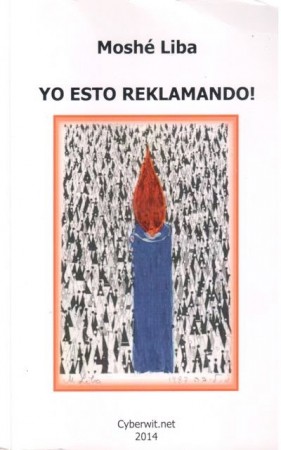Yo Esto Reklamando!
By Moshé Liba
Translated into Ladino/Judeo-Spanish by Zelda Ovadia
Allahabad (India): Cyberwit, 2014. ISBN 978-81-8253-502-2
Reviewed by Albert Garih

Yo Esto Reklamando! by Moshé Liba is a collection of poems written in Hebrew, published in 2011 in Jerusalem by Hamaatik Publishers under the title Ani Tovea! [I Claim!], and translated into Judeo-Spanish by Zelda Ovadia, with the cooperation of the author (Cyberwit.net 2014). It is dedicated to the victims of the Holocaust in Romania/Transnistria.
Born in Romania in 1931, Moshe Liba is a survivor of the Holocaust. After the war, he emigrated from Cyprus, where he had spent time in a refugee camp, to Israel, where he worked in a kibbutz, fought in the IDF, and pursued a career as a poet, novelist, playwright, painter, sculptor, and diplomat. As such, he represented Israel as ambassador or consul-general in fifteen countries.
This book is about the plight of the Jews in Romania during World War II. It describes plainly, without complacency, the fate of the Jews caught between the German Einsatzgruppen [Mobile Killing Squads] and the Romanian army and local population, which would raid villages and towns, round up the Jewish population, raping the women, killing everyone, sometimes mother and child with one bullet to save on ammunition, dumping the corpses into mass graves or just leaving them along the roadside.
His poetry doesn't need any lyricism to touch the hearts of the readers. He just has to describe plainly what happened, how Jews were forced into death marches from Ukraine to Transnistria, between the rivers Dnyester and Bug. Through different characters, he is claiming the memory of the Jews from Romania, Bessarabia, Bukovina, Moldavia, Ukraine, deported, forced to dig their own mass graves before being shot. He tells about the transports by train, where people on their way to the camps were heard begging for water from their cattle cars engulfed in a terrible stench of death and excrement. How the Romanian soldiers were taking women and young girls for their own pleasure, using deception to attract them, only to take advantage of them before killing them. How whole families were destroyed.
As a survivor, he was uniquely qualified to describe these horrors so simply, but at the same time so movingly. This book should be read by whoever wants or needs to learn about those times, the darkest period in human history.
Albert Garih is the former acting head of the French translation service at the World Bank, a Holocaust survivor, and a lecturer and guide at the United States Holocaust Memorial Museum.
